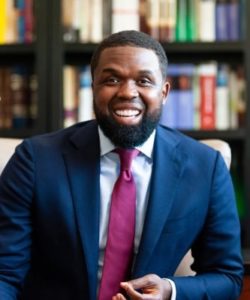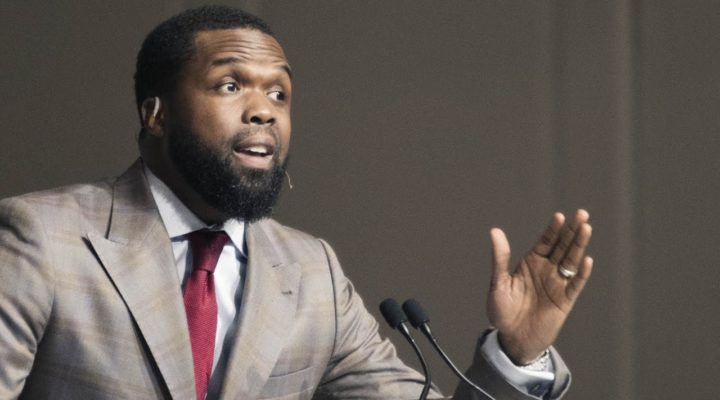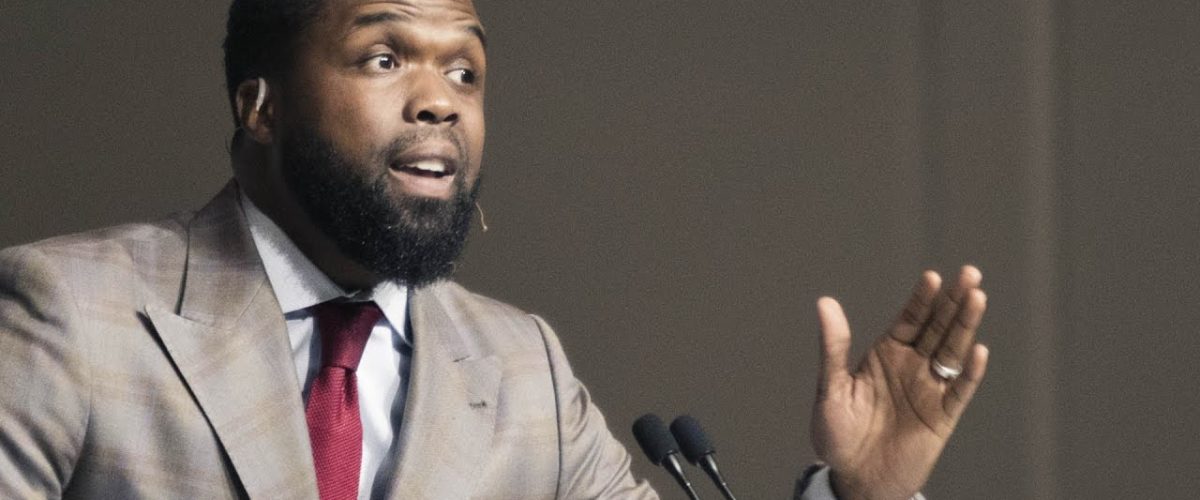For the second time in two days, a prominent Black pastor has publicly quit the Southern Baptist Convention over its seminary presidents’ campaign against Critical Race Theory.
“I keep hearing the words of Harriet Tubman: ‘We out,’” said Charlie Dates, senior pastor of Progressive Baptist Church in Chicago. He wrote an opinion piece with Religion News Service that was published Dec. 18.
This week, the three largest independent online news services covering Baptists — BNG, RNS and the Baptist Standard — have run pieces where prominent Black pastors have lambasted the SBC seminary presidents over their Nov. 30 statement on Critical Race Theory. The seminary heads said such structural frameworks for understanding systemic racism are rooted in “Marxism” and are “incompatible” with the Baptist Faith & Message, the SBC’s doctrinal statement.

Charlie Dates
“The hard reality of the seminary presidents’ statement is that Black people will never gain full equality in the Southern Baptist Convention,” Dates wrote. “My acknowledgement of this is not a statement of submission, but an act of defiance. The SBC’s power structure wants to maintain white dominance. They are happy to have a Black chapel speaker, the occasional conservative Black professor whose classes are not taken seriously or a Black employee who never bucks against their notions of superiority.”
Dates recounted how he had been inspired just two years ago when at the MLK50 Conference in Memphis, the SBC and The Gospel Coalition collaborated to celebrate the life and influence of Martin Luther King Jr.
“It was as if they had come to reckon with the ghosts of their past and the theological underpinnings that ignored his ministry,” he observed. “I left that conference feeling hopeful.”
As a result, his Progressive Baptist Church decided to take on dual alignment with the SBC alongside its previous affiliation with a historically Black Baptist group.
“The resistance, especially from some of our elderly membership, was swift and sincere,” he said. But he assured his congregants the “old Southern Baptists” were gone and there was a new era of leadership.
“I asked other SBC leaders, good Christian men, to challenge (Mohler). They would not.”
“But as 2020 went on, I grew increasingly uneasy,” he wrote. “When Albert Mohler, the president of the Southern Baptist Seminary, said the only politically moral option for Christians was the Republican Party, I asked other SBC leaders, good Christian men, to challenge him. They would not. I was shocked, but not surprised, when Mohler endorsed President Trump and watched the two men — on Reformation Day — celebrate each other on Twitter.
And then the six white male seminary presidents “told the world that a high view of Scripture necessarily required a corresponding and total rejection of Critical Race Theory and Intersectionality.”
That was “the last straw,” Dates declared.
“When did the theological architects of American slavery develop the moral character to tell the church how it should discuss and discern racism? When did those who have yet to hire multiple Black or brown faculty at their seminaries assume ethical authority on the subject of systemic injustice? How did they, who in 2020 still don’t have a single Black denominational entity head, reject once and for all a theory that helps to frame the real race problems we face?”
“Conservatism is, and has always been, the god of the SBC.”
Faced with this reality, Dates said he told his church he had been wrong about the SBC. “There is no such thing as ‘the Old Southern Baptists.’ Conservatism is, and has always been, the god of the SBC. To them, a belief in a high view of Scripture must mean an adaptation of Republican politics and, with it, the dismissal of Critical Race Theory and Intersectionality because of a fear of ‘liberalism.’
Dates accused the SBC leaders of being “selectively conservative.” They have defined “liberalism” to include abolition, the women’s suffrage movement, the Civil Rights Movement, “a Black U.S. president who was initially against partial-birth abortion,” non-white male faculty at their seminaries and now “a theory that uncovers our nation’s de jure and de facto segregation.”
Dates reserved his harshest criticism for Mohler, whom he noted “endorsed a philandering, racist president, thereby betraying his Black and brown Christian family. He told his trustees to uphold the slaveholder for whom his college is named. He hijacked the affirmation meeting of the Baptist Faith & Message, turning it into a conservative resurgence revival. In all that, he can never be criticized within his ranks. That’s the good ol’ boys’ club. That’s the old SBC.”
Sadly, he said, “our departure is not enough.” He proposed creation of a “new organism” that would not be led only by white men; “a Christian collective that makes room for the essentials of the faith and the diversity of the church; a robust engine that finances the impoverished sides of the church, speaks justice courageously to the government and cares gently for the oppressed, marginalized and women.”
Related articles:
SBC seminary presidents are propagating fear to maintain control | Laura Levens
Is it time for Black Christians to give up on the SBC? | Corrie Shull
How I learned to name my oppression — and my privilege | Meredith Stone


